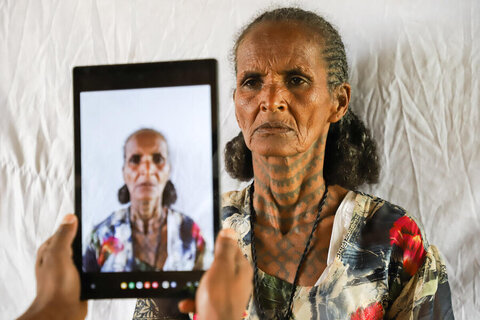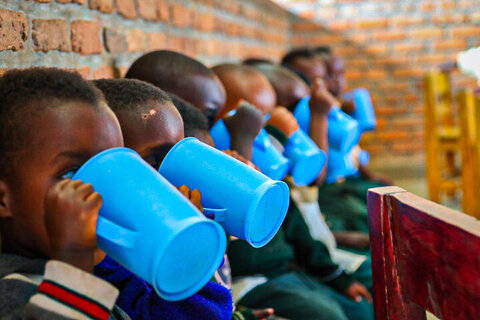4 simple steps to help families defeat drought in northern Ethiopia

They've been farming this land for 3,000 years. Generations of families ploughing soil whose fertility has ebbed away with the seasons. The climate can be equally merciless, with recent years especially bringing recurrent droughts capable of wiping out the harvests on which these communities depend.
On a visit to Tigray in northern Ethiopia however, it's clear that something is changing. Farmers we speak to are about to receive insurance payouts after the rains failed for the second time in three years.
Farmers who cannot afford the premiums in cash, pay instead by helping build assets that can counter the effects of drought, from embankments to channel water onto farmland, to rooftop traps to collect water. Women-headed households have the option to take part in home-based work, from compost making to building gardens fed by water pumps.
Some farmers use the insurance money to buy fertilizer to help re-enrich their soils. They have also applied for loans, allowing them to buy additional livestock. The additional income from selling their crops or animal products like milk sees loans repaid, and access to microcredit so their trade can expand even further.
Change is coming to families across regions
The multi-strand approach falls under what is known as the R4 Rural Resilience Initiative. It was launched by the World Food Programme (WFP) and Oxfam America in Ethiopia in 2011, to help farmers offset the effects of climate-related disasters such as drought and to create successful, long-term futures.
R4 refers to the four approaches taken in offsetting the risks that such disasters pose to communities: Risk reduction — building assets such as water traps; Risk transfer — such as insurance, Prudent risk taking — better access to loans and advice on how to use them, and broadening of activities to generate food and income; and Risk reserves — savings.
Nearly 32,000 people were insured in the Tigray and Amhara regions in 2017, around 40 percent of whom were women. Poor rainfall this year has just triggered the latest insurance payout.
Drought probably will return, but its effect on families and their lives is gradually changing for the better, as they explain here.
Asqual Gebreselassie has farmed a quarter hectare of land since 1991, originally growing barley, wheat, fava beans lentils. She has five children, aged 13–28. Her family eats 75 percent of the food grown, and she sells the rest.

"I joined R4 three years ago. I built my own microgarden and composted the land, as payment for the premiums. I also worked on a community plantation and soil and water conservation projects. In the garden I now grow green pepper, lettuce and cabbage. We eat most as a family and sell some at the market.
In the second year after I joined there was no rain, and I received insurance 400 Birr (US$14.5). This year I'm receiving one too. I'm using the money to buy fertilizer. This doubles my crop production, and my income from what I sell has increased by 50 percent.
I also received 3,000 Birr (US$109) in loans last year. I use the money to buy sheep, and I'm able to cover school fees for the children. One man comes to till the land, and I've hired an extra person.
This initiative is very important for my livelihood. It's also very important for the environment — we are working on soil and water conservation, and forestation activities.
My hope for the future is that this initiative increases its loan size and enables me to buy a cow. If I can have access to straw and grass, I can raise a dairy cow and sell milk."
Haftu Kidanu Hadgu received half a hectare of land in Mesanu village from his parents in 2004. He grows wheat, barley and maize, tomatoes and green peppers, with over half being sold at market. He and his wife Mehret Gebreselassie have three children, with two now at university. He joined R4 seven years ago and now helps collect data that determines insurance payouts.

"I was not in a good condition previously — I was facing many problems. I was a soldier and I didn't have any money. I had to sell my house.
R4 is very important for my livelihood, the initiative has supported me. Through the credit I received, I have been able to buy oxen and a water pump.
I have been able also to buy agricultural tools, fertilizer and vegetable seeds. I planted the seeds in my own land and with the water pump I can pump water up 400 metres from the river to irrigate the land. My crops have increased by 50 percent and I make 30 percent more money than before.
Before I had to take loans from other people to send my daughter to university, because I didn't have enough money in my pocket. But now I don't take any loans, I have already covered my expenses for my children as well as my family from my own pocket. My daughter Tariq is now an agrarian, working in Bureau of Agriculture, and my other daughter Messeret is studying for a BSc in Agriculture at university.

R4 is a very important initiative which supports the community in different ways. There would not be improvement in my livelihood if R4 didn't exist. I would have to take loans for my expenses, I may also be indebted to local money lenders and many lending organizations — so my status in society may also be lowered.
Now I am one of the collectors of the premiums in the village. I am a role model for the project and the community trust me."
Hagosa Demewoz has worked on her land in the Barka Adi-Sebha ward for 30 years. She grows barley, wheat, fava beans, lentils, lettuce, green pepper, cabbage, onion, salad and tomato. She joined the R4 initiative four years ago and helped pay her insurance premium through installing a water tank, among other work.

"Before I had the water tank, I had to collect water from the river, meaning I'd have to walk one hour each way. The quality of the water was not good, it was polluted by livestock. I built a microgarden for my own use. I also planted communal tree seedlings to grow eucalyptus and acacia saligna, which are used to feed livestock. We are harvesting grass also as feed.
During previous droughts we would collect wild vegetables to survive. I have benefited twice from insurance payouts. With the money I bought fertilizer. This land has been cultivated for the past 3,000 years, so it needs to be treated.

Before I had a microgarden, I would roast barley and sell it at the market. I used to go once a week, and it could take up to three hours each way. Now I don't have to go [as much]. The crops are mostly for my family to eat, but if I lack money for other things I sell some too.
I have also received 3,000 Birr (US$109) in a loan. I bought four sheep. They gave birth to four lambs, which I sold for 3,700 Birr (US$134.5). I also bought a donkey with the money [for transport]. I've also been able to save money. The extra money I have pays for school expenses, clothes for the children, fertilizer for the land.
I am happy with the project. I am seeing my livelihood improve, my life is changing. I hope, with a better life, my children will go to school and graduate, and can have a bright future."
You can learn more about WFP's R4 Initiative here
— Additional reporting by Melese Awoke


